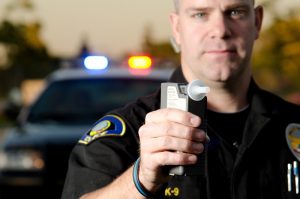If you are pulled over for suspicion of driving while intoxicated in Springfield, the law enforcement officer who pulled you over will ask you to perform a series of tests, known as Field Sobriety Tests. These tests, whose slang term is “Roadside Olympics” are physical tests that are designed to measure physical and mental perception. Of the five standardized tests, there are three that are most commonly used to test the abilities that are required to operate a vehicle, namely the Nystagmus test, One Leg Stand, and Walk-and-Turn. In addition to the Standardized Field Sobriety Tests (SFST), the police officer may require that you submit a blood, urine, or breath sample. Submitting to a breath, urine, or blood test is referred to as DWI Chemical Testing. Each of these tests, chemical testing, and SFST can be used against the defendant if he or she is charged with a DUI in Springfield.
This article discusses the types of Field Sobriety Tests you may be asked to perform and what the officer is looking for during these tests, along with whether or not you are under legal obligation perform these tests in Missouri. We’ll also discuss how a Springfield DWI lawyer can help you.
If you are facing criminal charges for a DUI and were asked to perform Field Sobriety Tests, DWI Springfield can assist you in defending your case. Contact us today to schedule a free consultation with one of our criminal defense attorneys in Springfield.
What Types of Field Sobriety Tests Are There?
Despite there being a high failure rate of Field Sobriety Tests from people who are not under the influence, FSTs are still used to as probable cause to arrest persons under the suspicion of drunk driving and can be used in court as evidence against the defendant. To combat this, there are required procedures that must be executed when a law enforcement officer asks a person to perform these tests. Following, are the three FSTs that are recognized by Missouri and may be used either alone or collectively to determine if a person is driving while intoxicated in Springfield:
Nystagmus Test
Nystagmus is a condition of the eyes which causes the eyes to move in jerky or uncontrolled movements. Nystagmus can also occur temporarily if someone is under the influence of drugs or alcohol. During this test, an officer will ask you to follow a finger or a pencil with your eyes about six inches away from your nose. The officer is looking to see if your eyes make jerky movements or cannot follow the object smoothly. Officers are required to have a person stand with their feet together and arms at their side while the test is administered. Additionally, if the officer moves the object too fast, the test could be dismissed as evidence against the defendant.
One Leg Stand
Another test that may be administered if you are pulled over for a DUI in Springfield is the One Leg Test. The One Leg Stand test (OLS) is a two-part test; the first part is primarily instructional, and the second will be when the person in question performs the balancing and counting section. To begin, the officer will ask you to stand with feet together and arms at your side and wait to move until instructed to do so. Next, the officer will follow these general instructions as outlined in this article:
- Raise one leg, either leg
- With your foot six inches of the ground and parallel to the ground (the officer will demonstrate)
- Count out loud until told to stop
- Keep arms at down at all time while watching the raised foot
In order to follow the proper procedure, the officer must time a person while they are counting and holding their foot in the air for 30 seconds.
Walk And Turn
Much like the OLS test, the Walk and Turn test is comprised of two parts; the instructions and the person in question’s performance.
In this FST, the officer will instruct you to walk on a line placing one foot in front of the other in a heel-to-toe manner. The officer will request you take a certain number of steps forward, turn around and walk in the same way, with the same amount of steps back on the same line. The following, could all be indicators of “failing” the test:
- Starting too early or not following instructions
- Losing your balance (steps off the line, uses arms for stability)
- Losing count of the number of steps
- Putting space between the heel and the toe
Do I Have To Perform Field Sobriety Tests in Missouri?
In Missouri, a person is not required to perform field sobriety tests. However, the Implied Consent Law does enforce the use of chemical testing. What this means is that under the Implied Consent Law, if you’re pulled over for driving while intoxicated in Springfield and refuse to submit to a chemical test (blood, urine or breath), you will face penalties. If a person decides to refuse a chemical test, they will immediately have their driving privileges revoked for one year, regardless of a charge or conviction for a Springfield DUI. You can find more information about the process of refusing a chemical test in Missouri, here.
If you or a loved one is facing criminal DUI charges in Springfield, contact DWI Springfield today. Field Sobriety Tests are often inadmissible in court due to their volatility; our experienced attorneys can assist you in fighting the charges and “results” of the FSTs that were administered to you at the time of your arrest.
